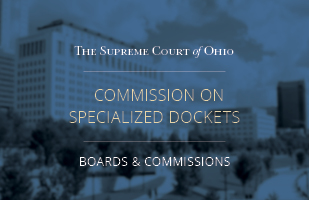Specialized Dockets: Perspectives Push Innovation

The Commission on Specialized Dockets balances advisory and administrative duties to help treatment courts in Ohio grow.

The Commission on Specialized Dockets balances advisory and administrative duties to help treatment courts in Ohio grow.
Editor’s Note: This story is part of a series on the Ohio Supreme Court’s boards and commissions.
Few initiatives to improve the state justice system demonstrate the constant push for change the way Ohio’s specialized dockets do.
These local court programs – more than 250 – are dedicated to alternative ways of addressing criminal offenses by treating a person instead of just a problem. The Ohio Supreme Court’s Commission on Specialized Dockets plays a pivotal role in the growth and development of these initiatives.
“Being a part of the commission is an opportunity to have a direct influence on the operations of the specialized dockets in Ohio, and to truly be a leader in the state,” said Monica Kagey, manager of the Court’s Specialized Dockets Section.
What’s a Specialized Docket?Rule 36.20 in the Rules of Superintendence for the Courts of Ohio defines a specialized docket as “a particular session of court that offers a therapeutically oriented judicial approach to providing court supervision and appropriate treatment to individuals.”
For decades, local courts across Ohio experimented with, and incorporated, remedy-based dockets to address more pervasive issues within their communities – namely drugs and alcohol.
In 2013, the Supreme Court created a certification process to establish basic standards and rules as guides for these prospective specialized dockets.
It was a way for Ohio courts to adopt similar structures and expectations about how to manage a docket, and a more effective way to monitor their successes and setbacks.
All 11 treatment-court classifications are tied either to substance use or mental health issues. Many include both. Most programs are dedicated to adults, but there are also specialized juvenile dockets.
Aside from standard drug courts, there are courts dedicated to human trafficking survivors, military veterans, family dependency, impaired drivers, domestic violence offenders, and re-entry – the latter for individuals returning to the community after being released from prison.
Duties of the DelegationWhile the Court’s Specialized Dockets Section – comprised of a manager, policy counsel, analysts, and a program coordinator – provides the technical support to trial courts with prospective and certified programs, the Commission on Specialized Dockets uses its advisory role to help treatment courts grow.
The commission also carries administrative weight because it approves the final certification of applicants.
Once a trial court meets all the preparatory and logistical requirements for implementing a specialized docket, it receives an initial certification from the Specialized Dockets Section, allowing the court to put its plan into practice for several months.
A section staff member then conducts a site review to gauge whether the court successfully demonstrated its ability to execute the program. These meetings are followed by a report to the commission with a recommendation whether to fully certify the specialized docket.
In addition to having final say in the certification process, the commission serves as a catalyst in the creation and enhancement of ideas.
In 2019, the commission laid the groundwork to start data collection among treatment courts through a subcommittee, which identified how to get the project off the ground and what information to collect.
Since the Ohio judicial system isn’t a one-size-fits-all entity, the Specialized Dockets Section allows local courts the flexibility to tailor a model to their community’s specific needs and resources.
When trial courts have difficulties with certain topics or processes, Kagey says, “the commission publishes guidance to provide more instruction on how to implement best practices, incorporate documents, and provide resources to local courts.”
A routine responsibility for the commission focuses on the Court’s largest annual event – the Specialized Dockets Conference. Commissioners spearhead planning and coordination for a two-day affair, featuring dozens of educational courses with several hundred people in attendance.
“They’re the guiding entity that plans and vets it,” Kagey said. “We get their input and coordinate on the agenda with them.”
Commission’s ConstructThe 22 volunteers who serve on the Specialized Dockets Commission represent the many stakeholders involved in these programs.
The majority come from the judiciary, which includes representation from all three trial-court levels – common pleas, municipal, and juvenile – and from various focuses, such as drug, mental health, and family treatment courts.
Aside from judges, commission members include magistrates, probation officers, a prosecutor, a public defender, and a program coordinator.
During the commission’s quarterly meetings, the broad-based, multidisciplinary group that covers “all four corners of the state” engages in deep discussions about matters impacting specialized dockets and how best to address them.
“Each entity is the authority in their realm. But in the commission, they must meet in the middle to make progress,” Kagey said. “They have a great balance of perspectives. So, they can have a great debate and disagree, and still have a consensus on what course of action to take.”
Commissioners serve three-year terms and can be reappointed for up to three consecutive terms.
Service on the Commission on Specialized Dockets is one of the many ways a judge, attorney, and court personnel can give back to the profession. The Commission on Specialized Dockets, like other boards and commissions, has a need for volunteers to share in maintaining the integrity of the profession. The justices of the Ohio Supreme Court appoint the members of the board and are always grateful for applications from those willing to serve.


